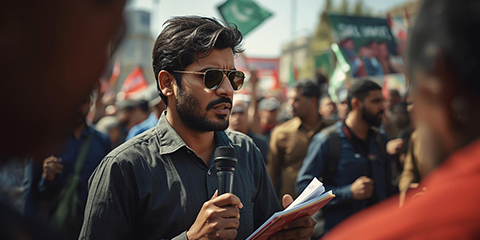The ultimate guide to conducting interviews like a pro
JournalismPakistan.com | Published: 9 June 2024
Join our WhatsApp channel
Conducting interviews is vital across multiple fields. This guide provides actionable steps to enhance your interviewing skills and gather valuable insights.Summary
Conducting interviews is a critical skill in journalism, HR, and various professional fields. Mastering this skill can significantly enhance the quality of your interactions and the information you gather. Here's a comprehensive guide to help you conduct interviews like a pro.
Preparation is KeyResearch Thoroughly Before the interview, research the subject or interviewee extensively. Understand their background, recent activities, and relevant context to formulate insightful questions. Well-prepared questions demonstrate professionalism and respect for the interviewee's time and expertise.
Prepare Your Questions Craft open-ended questions that encourage detailed responses. Avoid yes/no questions and focus on questions that begin with "how," "why," or "what." Structure your questions logically, starting with broader topics and narrowing down to specifics.
Setting the StageChoose the Right Environment Select a quiet, comfortable location free from distractions. Ensure the setting is conducive to a smooth conversation, whether it's a face-to-face meeting or a virtual interview.
Test Your Equipment If conducting a virtual interview, test your equipment beforehand. Ensure your internet connection is stable, and check your audio and video settings. A technical glitch can disrupt the flow of the interview and affect the quality of the recording.
During the Interview:Build Rapport Start with small talk to put the interviewee at ease. A relaxed interviewee is more likely to provide candid and insightful responses. Show genuine interest in their answers and maintain eye contact.
Listen Actively Active listening is crucial. Pay close attention to the interviewee's responses, and be prepared to ask follow-up questions based on their answers. This demonstrates engagement and can uncover deeper insights.
Stay Neutral and Objective Maintain a neutral tone and avoid expressing your opinions or judgments. Your goal is to gather information, not to debate or persuade. Keep the focus on the interviewee and their perspective.
Post-Interview Steps:Review Your Notes and Recording Immediately after the interview, review your notes and any recordings. Highlight key points and quotes while the conversation is still fresh in your mind. This will make the analysis and writing process smoother.
Follow Up Send a thank-you note to the interviewee, expressing appreciation for their time and insights. This helps build professional relationships and opens the door for future interactions.
Handling Common Challenges:Managing Difficult Interviewees Stay calm and composed if the interviewee is uncooperative or evasive. Politely steer the conversation back to your questions, and be patient. Sometimes, rephrasing a question can elicit a better response.
Dealing with Technical Issues If technical issues arise, address them promptly and professionally. Have a backup plan in place, such as an alternative communication method or a rescheduled interview slot.
By following these tips and techniques, you can conduct interviews that are professional, insightful, and productive. Whether you're a journalist, an HR professional, or in any field that requires interviewing, mastering this skill will significantly enhance the quality of your work.
KEY POINTS:
- Research the interviewee thoroughly before the meeting.
- Prepare open-ended questions to elicit detailed responses.
- Establish a comfortable environment to encourage openness.
- Practice active listening and engage with follow-up questions.
- Review notes immediately after the interview for better analysis.

























